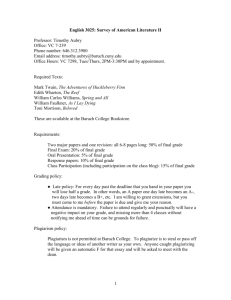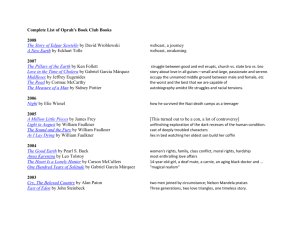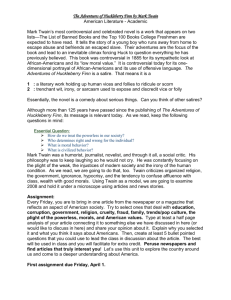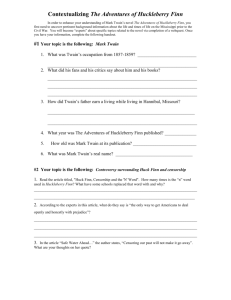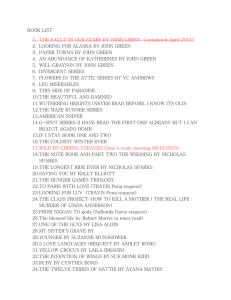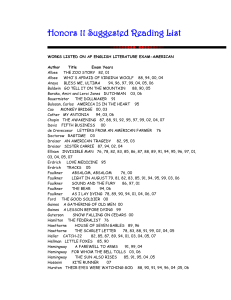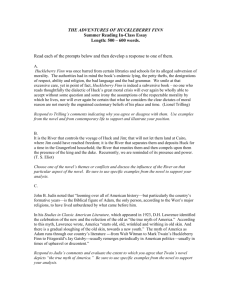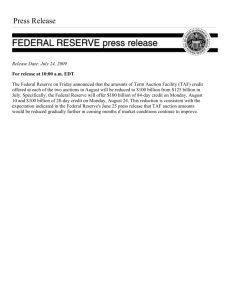English 3025 Fall 2015 - Blogs@Baruch
advertisement
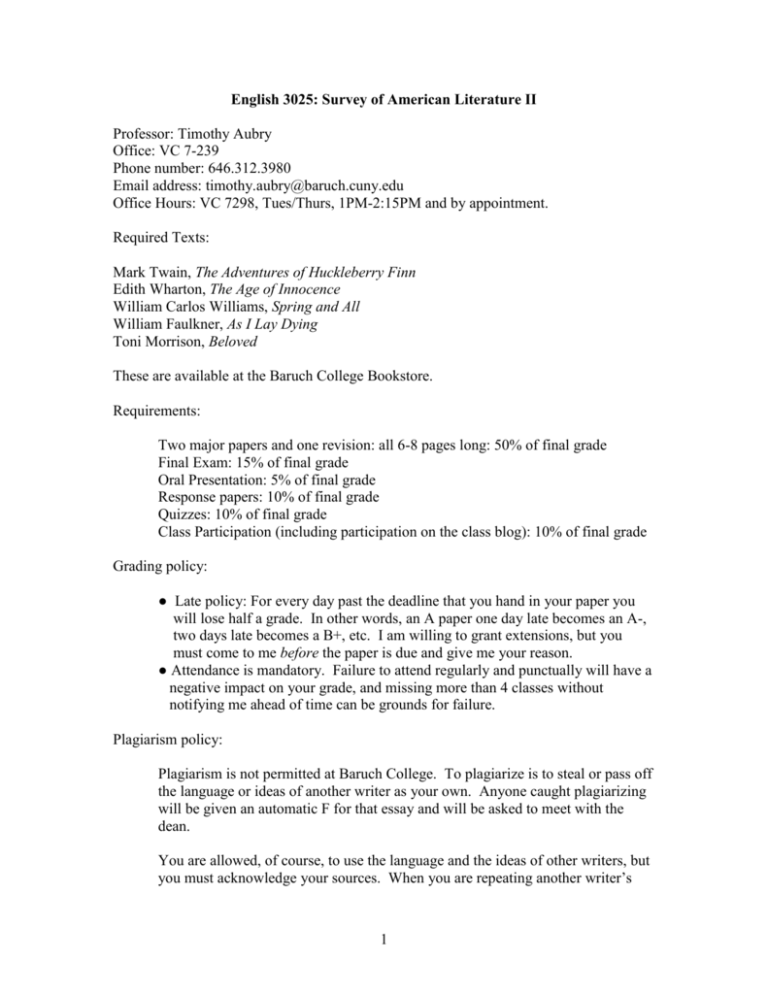
English 3025: Survey of American Literature II Professor: Timothy Aubry Office: VC 7-239 Phone number: 646.312.3980 Email address: timothy.aubry@baruch.cuny.edu Office Hours: VC 7298, Tues/Thurs, 1PM-2:15PM and by appointment. Required Texts: Mark Twain, The Adventures of Huckleberry Finn Edith Wharton, The Age of Innocence William Carlos Williams, Spring and All William Faulkner, As I Lay Dying Toni Morrison, Beloved These are available at the Baruch College Bookstore. Requirements: Two major papers and one revision: all 6-8 pages long: 50% of final grade Final Exam: 15% of final grade Oral Presentation: 5% of final grade Response papers: 10% of final grade Quizzes: 10% of final grade Class Participation (including participation on the class blog): 10% of final grade Grading policy: ● Late policy: For every day past the deadline that you hand in your paper you will lose half a grade. In other words, an A paper one day late becomes an A-, two days late becomes a B+, etc. I am willing to grant extensions, but you must come to me before the paper is due and give me your reason. ● Attendance is mandatory. Failure to attend regularly and punctually will have a negative impact on your grade, and missing more than 4 classes without notifying me ahead of time can be grounds for failure. Plagiarism policy: Plagiarism is not permitted at Baruch College. To plagiarize is to steal or pass off the language or ideas of another writer as your own. Anyone caught plagiarizing will be given an automatic F for that essay and will be asked to meet with the dean. You are allowed, of course, to use the language and the ideas of other writers, but you must acknowledge your sources. When you are repeating another writer’s 1 language verbatim you must use quotation marks and cite your source with a parenthetical citation (including the last name of the author and the page number) and an entry in your works cited list. When you are paraphrasing another writer—putting that writer’s ideas into your own words—you also must include a parenthetical citation and an entry in your works cited list. Schedule August 27: Introduction. September 1: Mark Twain, The Adventures of Huckleberry Finn (1885), pp. 1-57 September 3: Mark Twain, Huckleberry Finn, pp. 58-146 Response Paper #1 September 8: Mark Twain, Huckleberry Finn, pp. 147-218 September 17: Mark Twain, Huckleberry Finn, pp. 219-307 September 24: Emily Dickinson (1830-1886), “Success is counted sweetest”; “‘Faith’ is a fine invention”; “I’m ‘wife’—I’ve finished that—”; “I like a look of Agony”; “There’s a certain Slant of light”; “I felt a Funeral in my Brain”; “A Clock stopped”; “The Soul selects her own Society”; “The difference between Despair”; “Nature—sometimes sears a Sapling”; “Some keep the Sabbath going to Church—”; “A Bird came down the Walk—”; “After a great pain, a formal feeling comes—”; “Much Madness is divinest Sense”; “I heard a Fly buzz—when I died—”; “This World is not Conclusion”; “The Brain—is wider than the Sky—”; “She rose to His Requirement— dropt”; “This Consciousness that is aware”; “It bloomed and dropt, a Single Noon—”; “A narrow Fellow in the Grass”; “Oh Sumptuous moment”; “Tell all the Truth but tell it slant—”; “As imperceptibly as Grief”; “The farthest Thunder that I heard”; “Apparently with no surprise,” electronic reserve. September 25: Mary E. Wilkins Freeman, “A New England Nun” (1891) 109-125; “The Revolt of ‘Mother” (1891), 293-313, electronic reserve September 29: W.E.B. DuBois, The Souls of Black Folk (1903), pp. 3-15; 36-48, electronic reserve; Charles Chesnutt, “The Wife of his Youth,” (1899), pp. 1-24, electronic reserve October 1: Stephen Crane, The Open Boat (1898), pp. 885-909, electronic reserve October 6: Sui Sin Far, “Mrs. Spring Fragrance” (1910), pp. 17-28; “The Wisdom of the New” (1912), pp. 42-61; “In the Land of the Free” (1912), pp. 93-101, electronic reserve 2 October 8: William Carlos Williams, Spring and All (1923), Introduction, pp. vii-xii; Poems, pp 1-45. October 13: First Major Paper Due William Carlos Williams, Spring and All, pp. 45-93 October 15: Edith Wharton, Age of Innocence (1920), pp. 1-83 October 20: Edith Wharton, The Age of Innocence, pp. 83-165 October 22: Edith Wharton, The Age of Innocence, pp. 165-235 October 27: Ernest Hemingway, selections from In Our Time (1925): Chapters I-IX, “The Three Day Blow,” 39-49; “A Very Short Story,” 65-66; “Big TwoHearted River: Part I,” 133-142; “Big Two-Hearted River: Part II,”146156, electronic reserve Response Paper #2 October 29: Langston Hughes (1902-1967), “The Negro Speaks of Rivers”; “Mother to Son”; “The Weary Blues”; “I, Too”; “Mulatto”; “Song for a Dark Girl”; “Genius Child”; “Refugee in America”; “Madam and Her Might-HaveBeen”; “Democracy”; “Silhouette”; “Notes on Commercial Theater”; electronic reserve Response Paper #2 Due November 3: William Faulkner, As I Lay Dying (1930), pp. 3-64 November 5: William Faulkner, As I Lay Dying, pp. 65-111 November 10: William Faulkner, As I Lay Dying, pp. 112-193 November 12: William Faulkner, As I Lay Dying, pp. 194-261 November 17: Allen Ginsberg (1926-1997), “Malest Cornifici Tuo Cutullo”; “Dream Record: June 8, 1955”; “Howl”; “Footnote to Howl”; “A Strange New Cottage in Berkeley”; “A Supermarket in California”; “Sunflower Sutra”; “America,” electronic reserve November 19: Second Major Paper Due Ana Castillo, selected poems (TBA), electronic reserve November 24: Toni Morrison, Beloved (1987), pp. 3-8 December 1: Toni Morrison, Beloved, pp. 87-158 3 December 3 Toni Morrison, Beloved, pp. 159-247 Response Paper #3 December 8: Toni Morrison, Beloved, pp. 258-324 December 10: David Foster Wallace, Good Old Neon (2004), pp. 141-181 4
